The (Almost) Everything List
We know you need a lot of information about how to make decisions, school, adult life, financial assistance, and family resources. That’s why we’ve published our new (Almost) Everything List – it gives you what you need at your fingertips! It will be updated regularly with new information crowd-sourced from our community. Be sure to check back regularly for new resources.

Medical Guides and Info Sheets
 What does it mean to be an experienced pediatric epilepsy surgeon? What questions should you ask? This downloadable guide will help you understand what you should consider when choosing your child’s neurosurgeon. Download English PDF
What does it mean to be an experienced pediatric epilepsy surgeon? What questions should you ask? This downloadable guide will help you understand what you should consider when choosing your child’s neurosurgeon. Download English PDF
 This guide introduces you to the different types of epilepsy surgeries to stop drug-resistant seizures. It’s a helpful way to explain the different procedures to friends and family members, too. If you’re a health care provider, contact us for bulk ordering at info@brainrecoveryproject.org.
This guide introduces you to the different types of epilepsy surgeries to stop drug-resistant seizures. It’s a helpful way to explain the different procedures to friends and family members, too. If you’re a health care provider, contact us for bulk ordering at info@brainrecoveryproject.org.
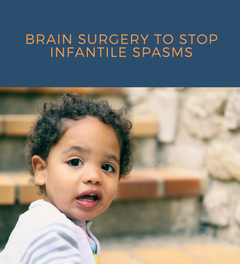 This guide introduces you to the concept of stopping infantile spasms with brain surgery. It makes clear that infantile spasms can have catastrophic consequences if they are not stopped early. Epilepsy surgery should not be a last resort to stop infantile spasms. Use this guide as a helpful way to explain epilepsy surgery to friends and family members, too. If you’re a health care provider, contact us at info@brainrecoveryproject.org to order in bulk.
This guide introduces you to the concept of stopping infantile spasms with brain surgery. It makes clear that infantile spasms can have catastrophic consequences if they are not stopped early. Epilepsy surgery should not be a last resort to stop infantile spasms. Use this guide as a helpful way to explain epilepsy surgery to friends and family members, too. If you’re a health care provider, contact us at info@brainrecoveryproject.org to order in bulk.
Download a PDF in English, Spanish, Vietnamese, French, Chinese, or Tagalog
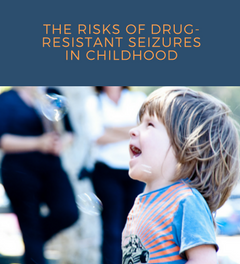 Drug resistant seizures can be catastrophic to development, especially if they begin in infancy. This guide helps explain the serious implication of intractable epilepsy in childhood. To order in bulk, contact us at info@brainrecoveryproject.org.
Drug resistant seizures can be catastrophic to development, especially if they begin in infancy. This guide helps explain the serious implication of intractable epilepsy in childhood. To order in bulk, contact us at info@brainrecoveryproject.org.
Download a PDF in English, Spanish, Vietnamese, French, Chinese, or Tagalog
 Drug resistant seizures are defined as failure of two appropriate and tolerated anti-epileptic drugs. This guide breaks down the International League Against Epilepsy’s definition of drug resistance. Download a PDF in English, Spanish, Vietnamese, French, Chinese, or Tagalog
Drug resistant seizures are defined as failure of two appropriate and tolerated anti-epileptic drugs. This guide breaks down the International League Against Epilepsy’s definition of drug resistance. Download a PDF in English, Spanish, Vietnamese, French, Chinese, or Tagalog
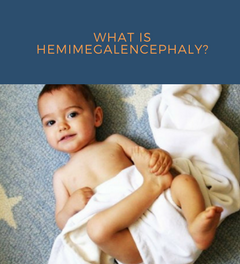 Hemimegalencephaly is a rare condition, often requiring hemispherectomy. This guide helps parents understand this very rare condition. Download an English PDF
Hemimegalencephaly is a rare condition, often requiring hemispherectomy. This guide helps parents understand this very rare condition. Download an English PDF
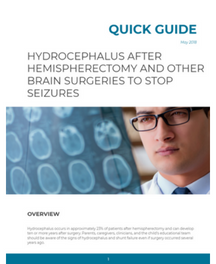 Hydrocephalus occurs in approximately 23% of children after hemispherectomy. This risk is across a lifespan. Our fact sheet summarizes the symptoms of hydrocephalus, imaging challenges, and other data from published research. Download a PDF
Hydrocephalus occurs in approximately 23% of children after hemispherectomy. This risk is across a lifespan. Our fact sheet summarizes the symptoms of hydrocephalus, imaging challenges, and other data from published research. Download a PDF
Education Guides
Not all students after epilepsy surgery will qualify for special education services under the Individuals with Disabilities Education Act (IDEA). If your child does not require specially designed instruction to benefit from their education, they may be entitled to protections under Section 504 of the Rehabilitation Act of 1973. This guide will help you understand how to advocate for a 504 plan in school.
Quick Guide to 504 Plans (PDF)
 Transitioning plans are an important part of teen’s individual education plan. This comprehensive guide will help you secure appropriate transition services for your youth. Download English PDF
Transitioning plans are an important part of teen’s individual education plan. This comprehensive guide will help you secure appropriate transition services for your youth. Download English PDF
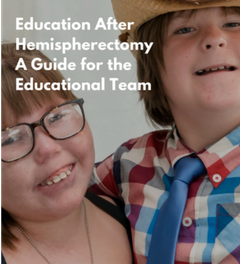 This guide provides parents, educators, and aligned professionals with an overview of the challenges a child after hemispherectomy will face in school. Download a PDF
This guide provides parents, educators, and aligned professionals with an overview of the challenges a child after hemispherectomy will face in school. Download a PDF
Vision After Hemispherectomy, TPO, and other surgeries which remove or disconnect the occipital lobe
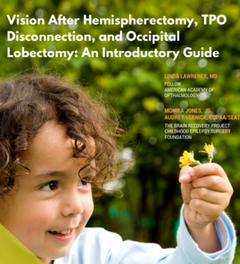 This guide summarizes the various visual impairments a child will have after hemispherectomy, TPO disconnection, and occipital lobectomy, and how they can affect a child’s daily living, functional mobility, and access to the educational curriculum in school. Download a PDF
This guide summarizes the various visual impairments a child will have after hemispherectomy, TPO disconnection, and occipital lobectomy, and how they can affect a child’s daily living, functional mobility, and access to the educational curriculum in school. Download a PDF
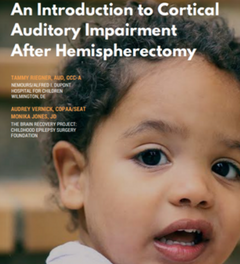 Hearing and listening after hemispherectomy can be a challenge. This guide helps your patient’s parents understand cortical auditory impairment after hemispherectomy. It is also helpful for understanding central auditory impairments in children who have had a temporal lobe disconnected or resected. Download a PDF
Hearing and listening after hemispherectomy can be a challenge. This guide helps your patient’s parents understand cortical auditory impairment after hemispherectomy. It is also helpful for understanding central auditory impairments in children who have had a temporal lobe disconnected or resected. Download a PDF
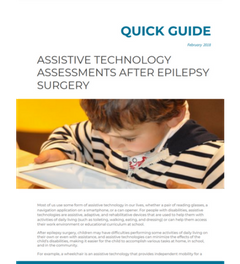 After epilepsy surgery, children may have difficulties performing some activities of daily living on their own or even with assistance, and assistive technologies can minimize the effects of the child’s disabilities, making it easier for the child to accomplish various tasks.
After epilepsy surgery, children may have difficulties performing some activities of daily living on their own or even with assistance, and assistive technologies can minimize the effects of the child’s disabilities, making it easier for the child to accomplish various tasks.
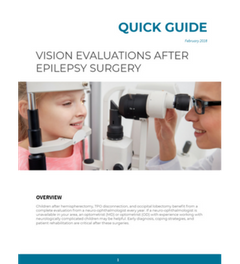 A complete annual evaluation from a neuro-ophthalmologist is beneficial to children after hemispherectomy, TPO disconnection, and occipital lobectomy. Early diagnosis, coping strategies, and patient rehabilitation are critical after these surgeries. Download an English PDF Download a Spanish PDF
A complete annual evaluation from a neuro-ophthalmologist is beneficial to children after hemispherectomy, TPO disconnection, and occipital lobectomy. Early diagnosis, coping strategies, and patient rehabilitation are critical after these surgeries. Download an English PDF Download a Spanish PDF
 There are many management options to address Central Auditory Processing Disorder. These can include therapeutic and environment interventions and compensatory strategies to help the child to be as successful as possible. Although written for children after hemispherectomy surgery, this guide is relevant for any child who has had a temporal lobe removed or disconnected.
There are many management options to address Central Auditory Processing Disorder. These can include therapeutic and environment interventions and compensatory strategies to help the child to be as successful as possible. Although written for children after hemispherectomy surgery, this guide is relevant for any child who has had a temporal lobe removed or disconnected.
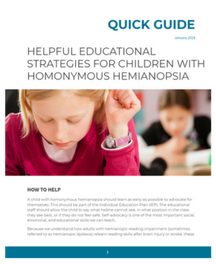 A child with homonymous hemianopsia should learn as early as possible to advocate for themselves. This guide provides key strategies for one of the most important social, emotional, and educational skills we can teach, self advocacy. Download an English PDF Download a Spanish PDF
A child with homonymous hemianopsia should learn as early as possible to advocate for themselves. This guide provides key strategies for one of the most important social, emotional, and educational skills we can teach, self advocacy. Download an English PDF Download a Spanish PDF
 Children after epilepsy surgery often require a 1:1 aide to help them navigate their school’s physical campus safely and sometimes to access the education curriculum. This brief info sheet describes how a dedicated aide can help a child after surgery. Download an English PDF Download a Spanish PDF
Children after epilepsy surgery often require a 1:1 aide to help them navigate their school’s physical campus safely and sometimes to access the education curriculum. This brief info sheet describes how a dedicated aide can help a child after surgery. Download an English PDF Download a Spanish PDF
Download this simple IEP Goal Tracker to help measure progress on IEP goals.
Our assessments spreadsheet provides you with a comprehensive view of the different types of assessments your child may need for the education team to understand his/her disabilities. You can view or download our assessments spreadsheet here.
Caregiving resources
- Managing the toll of caregiving trauma – Taking care of a child with drug-resistant epilepsy is a high risk factor for parenting stress. And, even if the child is seizure-free after epilepsy surgery, parenting stress never normalizes to the level of parents of neurotypical children. This free, pre-recorded webinar series will help you manage the stress of caregiving a child with multiple disabilities.


